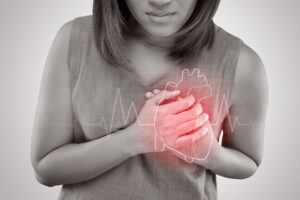Written by Dr. Sheba Price, Nursing Faculty for Arizona College of Nursing
What does heart health mean to you? It’s fair to say many of us think of heart health as preventing a heart attack and may conjure up images of someone clutching their chest. But heart attacks are only one type of heart disease that affects heart health, and stabbing pain in the chest isn’t the only sign your heart is in danger. We often ignore the quiet signs telling us our hearts need attention.
Let’s focus on three heart diseases that contribute to increased hospitalization, decreased quality of life, and increased risk of death. By understanding the types of heart health and recognizing their symptoms, we can better address our overall heart health.
Atrial Fibrillation
Have you ever felt that your heart rhythm was irregular, or your heart was beating too fast? That’s what atrial fibrillation feels like. Atrial fibrillation is a change in the heartbeat or rhythm where the top part of the heart muscle quivers instead of contracting. Sometimes, people feel it come and go or don’t feel any symptoms. Your risk increases with age, but it can affect younger individuals, too.
Atrial fibrillation, left unaddressed, can cause blood clots, increasing the risk of organ damage, stroke, heart failure, and death. Atrial fibrillation may present as recognizable symptoms of heart diseases like palpitations and chest pain. Other common symptoms can be shortness of breath, fatigue, dizziness, and reduced ability to exercise. Both men and women are at risk for developing atrial fibrillation, but men tend to develop symptoms more often than women, so women should pay close attention to anything that feels not of the ordinary.
Coronary Artery Disease

High blood pressure and cholesterol are indicators that you could have CAD, and both men and women can experience symptoms like chest pain, fatigue, and sweating. Women, especially younger women, can experience lesser-known symptoms like back pain, nausea, and vomiting.
Myocardial Infraction (Heart Attacks)
Heart attacks or myocardial infarction are what we all fear. Myocardial infarction occurs when there is a decrease or complete blockage of blood flow to the heart muscle. Heart attacks are when blood flow is severely reduced or completely blocked. The blockage is usually due to a buildup of fat or cholesterol over time or a rupture of the blockage that forms a clot and stops the blood flow to our heart.
Men are more likely to have a heart attack than women. However, women have an increased rate of dying from a heart attack, often because they don’t recognize the earlier symptoms of heart disease. The most common symptoms for both men and women are chest, arm, and jaw. The pain can be dull, heavy, tight, or a crushing sensation. Women tend to have atypical symptoms more often, such as nausea, vomiting, shortness of breath, and fatigue. They can also experience sleepiness, feelings of impending doom, and abdomen pain. It’s easy to explain away some of these symptoms as feeling off or having stress. The reality is these symptoms can indicate something much more serious.
Taking Control of Heart Health
The bottom line is that very rarely do heart attacks come out of the blue. Usually, there are signs that our health needs attention. The risk factors for any heart disease are high blood pressure, smoking, alcohol abuse, high cholesterol, diabetes, lack of exercise, stress, and obesity. Yes, age and heredity play a role. But you can control most of your risk factors.
Even though atrial fibrillation, heart failure, and myocardial infarction are serious issues that could lead to death, these diseases are manageable. The way to manage any disease is to be informed and decide to care for your body. Don’t ignore symptoms because they don’t feel like a severe heart issue. It’s better to address any symptoms, no matter how small, than to fight advanced heart disease. Your choices today go a long way to determining your future health.

In tribute to her father, Dr. Price completed the Doctorate of Nursing Practice (DNP) program from Samford University in 2022. She also holds a Master of Science in Nursing Administration (MSN) from the University of South Alabama and a Bachelor of Science in Nursing (BSN) from Mississippi University for Women.

